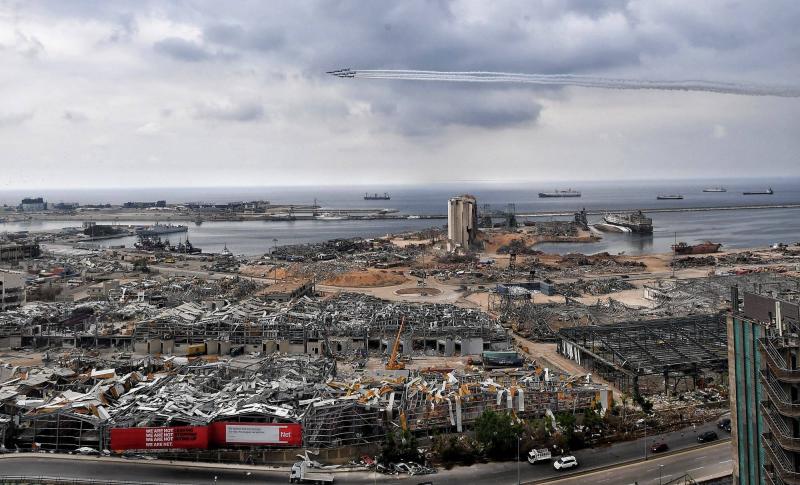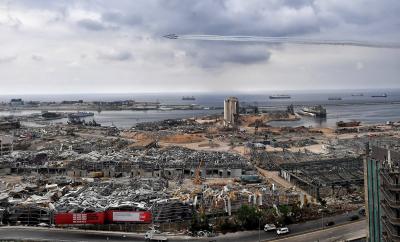On Wednesday, Lebanon marks the anniversary of the Beirut port explosion that killed over 200 people, devastated neighborhoods in the city, and exacerbated an ongoing economic collapse. The Lebanese are calling for justice and criticizing the lack of accountability for those responsible for the horrific explosion. Concurrently, donor countries will hold their third conference entitled "For Lebanon" via video conference, organized by France and under the auspices of the United Nations, hoping to raise $350 million.
Opposition parties and activist groups formed during the 2019 protests against the ruling class have called for demonstrations in several areas of Beirut under the slogan "Justice Now." French President Emmanuel Macron will seek to gather more than $350 million in aid for Lebanon during the donor conference, which also aims to send another warning to the warring Lebanese political elite. A year after the explosion shook the capital's port and plunged Lebanon into economic crisis, politicians have yet to form a government capable of rebuilding the country, despite French and international pressures. A Macron advisor stated, "As the situation continues to deteriorate, the need for a government has become more urgent."
International efforts to rescue Lebanon from the crisis have been led by France, with Macron visiting Beirut twice since the explosion, increasing emergency aid, and imposing travel bans on some senior Lebanese officials as part of his push for a reform package. He also persuaded the European Union to approve a sanctions framework ready for use. However, his initiatives, including securing commitments from Lebanese politicians to agree on a non-sectarian expert government, have so far failed.
Macron's office announced that U.S. President Joe Biden will participate in the conference hosted by the United Nations alongside nearly 40 other world leaders, including the leaders of Egypt, Jordan, Iraq, and Canada. The UK will be represented by its foreign secretary. Last year's conference following the explosion raised approximately $280 million, with emergency aid withheld from what Macron described at the time as "corrupt hands" of politicians and instead funneled through NGOs and relief organizations. Macron's office indicated that the new humanitarian aid would be unconditional, but about $11 billion of long-term funding raised in 2018 remains withheld and conditioned upon a series of reforms that political authorities must implement.
The Beirut Port Explosion
On August 4, 2020, a fire broke out at the Beirut port, followed by a massive explosion at 6:07 PM (15:00 GMT), whose shockwaves reached the island of Cyprus, causing extensive damage to the port and surrounding neighborhoods, affecting most of the city and its suburbs. Authorities attributed the explosion to 2,750 tons of ammonium nitrate that had been stored since 2014 in hangar 12 at the port. The explosion killed at least 214 people, including port employees and firefighters attempting to extinguish the fire, with others killed in their homes from falling glass or in their cars, streets, cafes, and shops. Many families buried only the remains of their loved ones.
In a country that has seen assassinations and bombings go unsolved over the past 20 years, with no perpetrators held accountable, the Lebanese continue to await answers to determine responsibilities and the spark that led to one of the largest non-nuclear explosions in the world.
Mourning and Marches
Authorities declared Wednesday a day of mourning, but there were no official or governmental participations in any of the numerous events organized to commemorate the anniversary. Families of the victims called for marches starting at 3:30 PM (12:30 GMT) towards the port, where Islamic and Christian prayers will be read. At exactly 6:07 PM, the moment of the explosion, names of the explosion victims will be read aloud. Protests called for by opposition parties, groups, lawyers, and doctors will also emerge from various areas in Beirut, converging near the port before heading to the parliament.
The explosion disaster, combined with the prior outbreak of the coronavirus, has deepened the economic collapse that Lebanon has been experiencing since the summer of 2019, which the World Bank has classified as among the worst in the world since the mid-19th century. More than half of the Lebanese population now lives below the poverty line, the Lebanese pound has lost over 90% of its value against the dollar, and prices of essential goods have risen by more than 700% over two years. Since the port explosion, the international community has provided direct humanitarian aid to the Lebanese without going through state institutions accused of corruption and waste.




